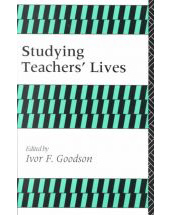Studying Teachers' Lives
Studying Teachers' Lives - an emergent field of study
In the late 1960s and early 1970s this approach changed somewhat (but from the point of view of the teacher not necessarily for the better). Case study researchers began to examine schooling as a social process, particularly in the manner through which school pupils were 'processed'. 'The sympathies of the researchers lay primarily with the pupils, working class and female pupils in particular, who were the "under dogs" in the classroom, teachers were the villains of the piece.' By the late 1970s we discerned a further shift: 'attention began to be directed to the constraints within which teachers work... Teachers were transformed from villains to victims and in some cases, "dupes" of the system within which they were required to operate [i].
But this latter characterization of teachers finally opened up the question of 'how teachers saw their work and their lives'. Writing in 1981, I argued that researchers had not confronted the complexity of the schoolteacher as an active agent making his or her own history. Researchers, even when they had stopped treating the teacher as numerical aggregate, historical footnote or unproblematic role incumbent still treated teachers as interchangeable types unchanged by circumstance or time. As a result new more contextually sensitive research was needed which stressed life history methods:
The pursuit of personal and biographical data might rapidly challenge the assumption of interchangeability. Likewise, by tracing the teachers' life as it evolved over time - throughout the teachers' career and through several generations - the assumption of timelessness might also be remedied. In understanding something so intensely personal as teaching it is critical we know about the person the teacher is. Our paucity of knowledge in this area is a manifest indictment of the range of our sociological imagination. [ii]
In the event, while the argument for studies of teachers lives and careers now began to be more generally pursued in the educational research community, political and economic changes were moving into a period of conservative reaction. In 1979, the era of Thatcherism began in Britain and this presaged an attack on most forms of socially-curious (let alone critical) educational research. As Measor and Sikes, using a beginning quote from Hargreaves, diplomatically (and perhaps wisely!) understate:
It may not be enough in Britain in the 1980s to say that sociological investigation is itself evidently desirable. There has been 'A decline in government interest in investing in independent questioning and self criticism...' We need to take care to ensure that we do not imply that we see teachers as deprived underdogs, nevertheless teachers do work in a context which currently threatens their working autonomy and their conditions of employment and choice over the ways they teach children (p. 229).
[i] ibid., p. 7.
[ii] Goodson, I.F. (1981) 'Life history and the study of schooling', lnterchange, Ontario Institute for Studies in Education, Vol. 11, No. 4, p.69.
